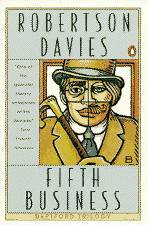Robertson Davies


| Click on a book's image or title to order from Amazon.com |

Fifth Business
Penguin Books, © 1970, 266 pp, ISBN #0-14-016794-3Reviewed June 2001
The first installment of Davies' "Deptford Trilogy", Fifth Business stands perfectly well on its own. The book is narrated by Dunstan Ramsay, one of a trio of boys born in the rural Canadian town of Deptford prior to World War I. These three men are linked when, just after Christmas in 1908, Ramsay and his friend Percy Boyd Staunton are having one of those not-quite-amicable boyhood altercations, and a snowball thrown by Staunton instead hits one Mrs. Dempster, the young and pregnant wife of one of the local ministers. Mrs. Dempster immediately goes into premature labor, bearing her son Paul, and subsequently losing some portion of her sanity. (The other two volumes of the trilogy focus on Staunton and Paul Dempster.)
As a result of this event, Ramsay finds himself feeling responsible for Mrs. Dempster's state, and for Paul's diminished stature. Mrs. Dempster's condition is a great burden to her husband, as she is barely able to take care of herself, much less help raise Paul. Nonetheless, Ramsay finds himself revering her as a sort of latter-day saint, and finds several times in his life that her presence or her memory seems to preside over miracles of sorts that he experiences.
Ramsay and Staunton are rivals as well as uneasy friends, and the ambitious Staunton seems to always end up on top. Eventually, following some traumatic events surrounding Mrs. Dempster, Ramsay decides to enlist and fight in Europe. This proves to be the other seminal event in Ramsay's life, leading him afterwards to become a scholar, particularly on the subject of Christian saints.
Fifth Business explains that its title refers to a character in plays who is not the protagonist, the villain or a romantic interest, but is a pivotal character in that he is necessary to the resolution or meaning of the story. An observer or confidante who explains the situation, for example. After a fashion, Ramsay plays this role for Staunton - who becomes a wealthy businessman with an unhappy family life - and for Dempster - who metamorphoses into the famous stage magician Magnus Eisengrim. But Fifth Business is really about Ramsay making sense of his own life, and find his own meaning in the world, whether through Mrs. Dempster or through the people he's able to help, or through his own work. Fame and fortune don't touch him as they do his childhood friends, but this isn't necessarily a bad thing.
Written in the form of Ramsay's memoir as he prepares to retire from teaching, the story is told in a straightforward manner, eschewing sentimentality, although the moments which mean the most to Ramsay are clear. It's not an emotionally overpowering book, but it quietly works towards portraying the life of a relatively quiet man. The characters are believable and the settings almost exotic in their plainness. The running theme of the novel is how the characters transform themselves (as symbolized by the name changes all three principals undergo as they mature) for better or for worse, flamboyantly or subtly, as circumstances or inner moods dictate.
I didn't think it was a great book - and I'm not especially moved to read the other two in the set - but it was enjoyable enough in its own way as a handbook of what made one particular life meaningful and worth living.
hits since 9 June 2001.